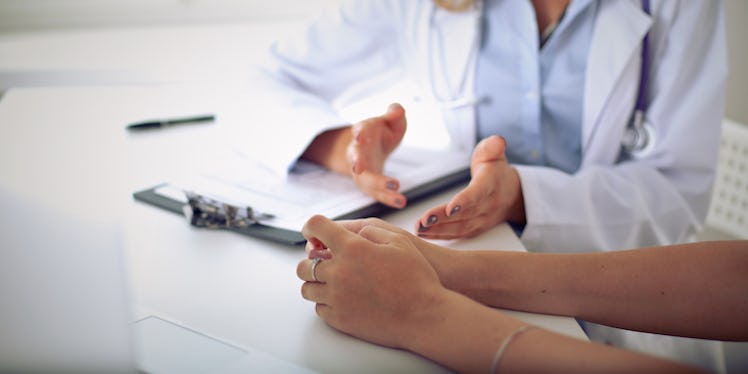
If You Find Out You’re HIV-Positive, Here Are 4 Immediate Steps To Take
Though treatment methods are strengthening for those living with HIV/AIDS, receiving a positive diagnosis is still a huge fear plaguing many individuals.
Although over a million people in the US are currently living with HIV, one in seven of those individuals have no idea they have it, according to HIV.gov.
While estimated annual infections in the US declined by 18 percent from 2008 to 2014, these statistics indicate how prevalent HIV actually is, the importance of getting tested, and the necessity for knowledge about what to do if you have the virus.
Because today is National HIV Testing Day, it's important to start a dialogue about what to do should your test come back positive. I asked Dr. Alexandra Anderson, MD, about the next steps to take if you find out you are HIV positive.
1. What Doctors Should You See?
"The first doctor to see is your primary care physician or general practitioner. They will assess your overall state of health by taking a thorough history, doing a physical exam, and performing lab tests," Anderson says.
With this understanding, your doctors can help you determine "how far the disease has advanced" as well as help you "make decisions about medications."
Anderson continues,
They should also address any other health issues, discuss how to prevent transmission of HIV to others, provide educational and support resources, and answer any questions. They may refer you to other doctors as needed. It's a good idea to keep a list of questions for your doctors as they come up so you can remember what you want to ask.
Additionally, the Foundation for AIDS Research (amfAR), provides a step-by-step list of things — such as getting a TB test and an STD test — you should immediately do following a positive HIV diagnosis.
2. What Treatments Are Available?
Remember, an HIV positive diagnosis does not mean that you have AIDS. According to amfAR, HIV may not develop into AIDS for several years, and one is only diagnosed after a lot of AIDS-related infections.
In terms of HIV-specific treatment options, Anderson states,
While medications cannot cure HIV, they can prevent disease progression and transmission. HIV medications are referred to as antiretroviral therapy, and a combination of drugs are used in an HIV regimen. Strict compliance is required and these medications will need to be taken daily for life; but the treatment can be very effective.
She also stresses that it's vital to address any other health concerns you have after receiving an HIV diagnosis: "Now is the time to take great care of yourself! Eating right, exercising, getting adequate rest, being consistent with check ups/screening, dental care, and emotional health are also important aspects of managing this disease."
3. What Other Resources Should HIV-Positive Individuals Take Advantage Of?
The Internet has a wealth of information for you, but it can also be your enemy.
"I will say to beware of 'Dr. Google,' though; googling symptoms and diagnoses can be very anxiety provoking. It's always best to put in a call or check in with your health care team when you have a question," Anderson explains.
She also offers some of her recommended go-to stops for useful information:
Your primary care provider should have a wealth of information and resources available. The internet can also be a very powerful tool. I really like the Elizabeth Taylor AIDS Foundation website; it's very comprehensive with a lot of good information. The NIH has a good HIV/AIDS information page as well. You can also find a lot of support online.
Additionally, amfAR also has a list of resources to utilize, which include advocacy organizations, organizations to help children, gay, lesbian, and transgender individuals, harm reduction and syringe exchange, HIV testing resources, and more.
4. What Are Some Next Steps Mentally And Emotionally?
Anderson says, "Testing positive for HIV can understandably be extremely overwhelming for anyone. The first step is to take a big breath and remember we have made tremendous strides in the treatment of HIV and AIDS. It can be a very manageable disease with medications and a good medical team."
However, the emotional and mental repercussions must be addressed on an individual basis, as there is not a one-size-fits-all solution to such a diagnosis.
"I personally find that information, education, and a plan can be very empowering and help to regain a sense of control during these times. It's also important to find your people; the people that provide the kind of support you need," Anderson says.
She also stresses the importance of remembering your emotional responses are completely warranted:
Any reaction or emotion is normal in this situation; denial, anger, confusion, frustration, stress, sadness, fear and even depression. It's important to realize that these feelings are a part of the process, and things that need to be identified and treated. Support groups and even individual therapy can be extremely helpful. Don't let your emotional health go untreated."
On National HIV Testing Day, it's important to remember that testing is not only important to your own health, but important to the health of all of your sexual partners.
And remember, if you have been diagnosed with HIV, you are still loved, and there are options and treatments out there for you.